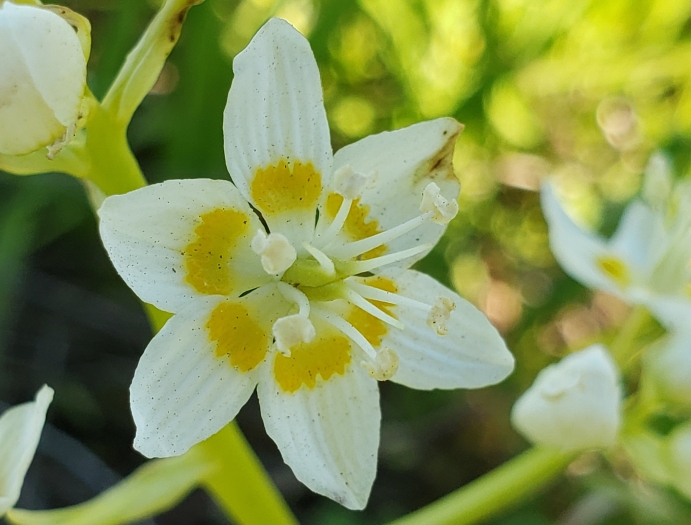Giant Deathcamas
(Toxicoscordion exaltatum)
Giant Deathcamas (Toxicoscordion exaltatum)
/
/

© Mary K. Hanson
CC BY 4.0
Image By:
© Mary K. Hanson
Recorded By:
Copyright:
CC BY 4.0
Copyright Notice:
Photo by: © Mary K. Hanson | License Type: CC BY 4.0 | License URL: http://creativecommons.org/licenses/by/4.0/ | Uploader: simpylmare55 | Publisher: iNaturalist |









Estimated Native Range
Summary
Toxicoscordion exaltatum, commonly known as giant deathcamas, is a perennial herb that is native to the western United States, specifically in California, Oregon, and Nevada. It is typically found in grasslands, meadows, and open woodlands, particularly in the Sierra Nevada foothills and other mountain ranges. The plant can grow up to 3 feet (1 meter) tall and features grass-like leaves and clusters of small, star-shaped white flowers that bloom in the spring. The flowers are not particularly showy but are noticeable when the plant is in full bloom. Giant deathcamas is most recognizable by its bulb, which is highly toxic.
Giant deathcamas is not typically cultivated due to its toxicity, but it is important for gardeners and hikers to recognize it in order to avoid accidental poisoning. The plant prefers well-drained soils and full sun to part shade conditions. While it is not used in gardens, it can serve as a cautionary example of the importance of plant identification in the wild. There are no popular garden cultivars of this species due to its poisonous nature. The main potential problem associated with giant deathcamas is its toxicity to humans and animals if ingested.CC BY-SA 4.0
Giant deathcamas is not typically cultivated due to its toxicity, but it is important for gardeners and hikers to recognize it in order to avoid accidental poisoning. The plant prefers well-drained soils and full sun to part shade conditions. While it is not used in gardens, it can serve as a cautionary example of the importance of plant identification in the wild. There are no popular garden cultivars of this species due to its poisonous nature. The main potential problem associated with giant deathcamas is its toxicity to humans and animals if ingested.CC BY-SA 4.0
Plant Description
- Plant Type: Bulb
- Height: 1.5-2.5 feet
- Width: 0.5-1 feet
- Growth Rate: Moderate
- Flower Color: White
- Flowering Season: Spring
- Leaf Retention: Deciduous
Growth Requirements
- Sun: Full Sun, Part Shade
- Water: Medium
- Drainage: Fast, Medium
Common Uses
Low Maintenance, Rock Garden
Natural Habitat
Native to grasslands, meadows, and open woodlands in the western United States, particularly in California, Oregon, and Nevada
Other Names
Common Names: Mountain Death Camas, Exalted Zigadenus
Scientific Names: , Toxicoscordion exaltatum, Zigadenus exaltatus, Zygadenus exaltatus,
GBIF Accepted Name: